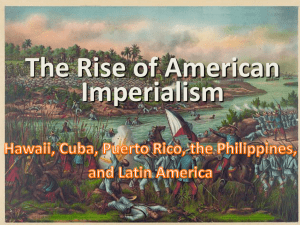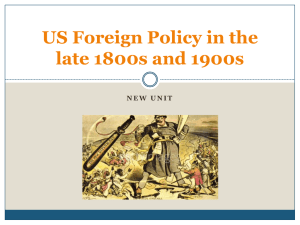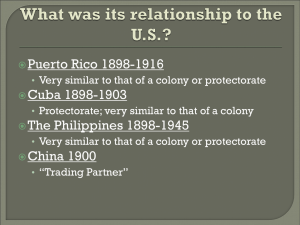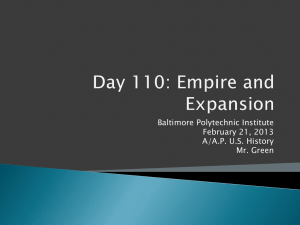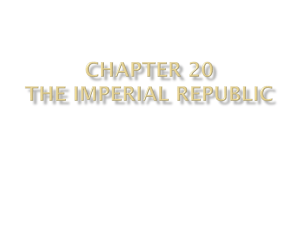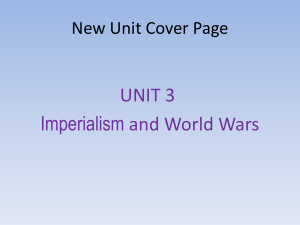Carroll Christian Carroll Doctor Abigail Heiniger Honors
advertisement
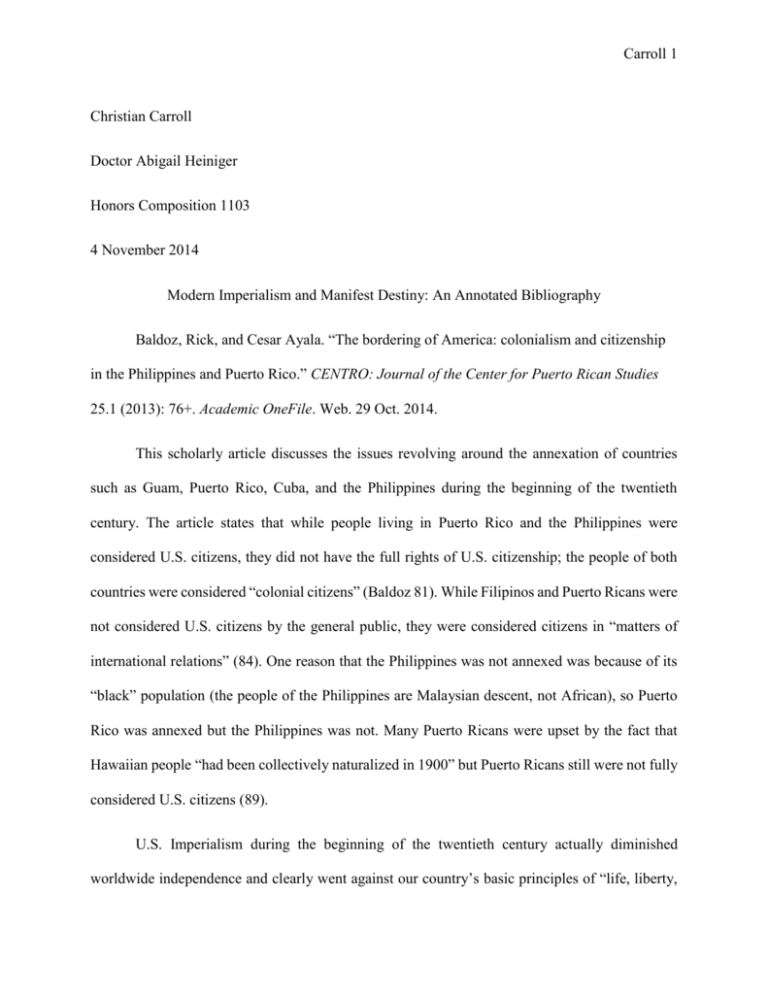
Carroll 1 Christian Carroll Doctor Abigail Heiniger Honors Composition 1103 4 November 2014 Modern Imperialism and Manifest Destiny: An Annotated Bibliography Baldoz, Rick, and Cesar Ayala. “The bordering of America: colonialism and citizenship in the Philippines and Puerto Rico.” CENTRO: Journal of the Center for Puerto Rican Studies 25.1 (2013): 76+. Academic OneFile. Web. 29 Oct. 2014. This scholarly article discusses the issues revolving around the annexation of countries such as Guam, Puerto Rico, Cuba, and the Philippines during the beginning of the twentieth century. The article states that while people living in Puerto Rico and the Philippines were considered U.S. citizens, they did not have the full rights of U.S. citizenship; the people of both countries were considered “colonial citizens” (Baldoz 81). While Filipinos and Puerto Ricans were not considered U.S. citizens by the general public, they were considered citizens in “matters of international relations” (84). One reason that the Philippines was not annexed was because of its “black” population (the people of the Philippines are Malaysian descent, not African), so Puerto Rico was annexed but the Philippines was not. Many Puerto Ricans were upset by the fact that Hawaiian people “had been collectively naturalized in 1900” but Puerto Ricans still were not fully considered U.S. citizens (89). U.S. Imperialism during the beginning of the twentieth century actually diminished worldwide independence and clearly went against our country’s basic principles of “life, liberty, Carroll 2 and the pursuit of happiness.” The U.S. used the war against Spain as an excuse to expand its borders and compete with Britain for world dominance. While this source defines U.S. imperialism, it is not subjective, but rather objective in its viewpoint. The sources’ objectivity broadens its’ audience, yet the article is clearly scholarly. Carlos, Alfredo. “Mexico ‘under Siege:’ Drug Cartels or U.S. Imperialism?” Latin American Perspectives. 41.2 (2014): 43-59. Print. As a peer-reviewed scholarly article, this article defends Mexico and determines that the United States portrays Mexico as an unsafe country that could soon impede the good ole’ American lifestyle—“[…] it masks [Mexico’s] origin in U.S. economic foreign policy while providing justification for continued and future U.S. paternalism and domination” (Carlos 44). The article claims that the U.S.’s discourse on Mexico started back in the 1800s “in which the Unites States made a concerted effort to dominate Mexico economically and subordinate it to U.S. corporate interests” (47). In reality, “Mexico is suffering much more from extreme economic inequality, caused in large part by U.S. economic imperialism and capital extraction […] than drug-related violence” and therefore people have moved out of Mexico. The article claims that while Mexico does have crime issues, they are not nearly as bad as other Latin countries or even the U.S.; in fact, the U.S. has the highest prison population in the world. Also, it is noted that more people in the U.S. kill themselves each year than the numbers of murders committed in Mexico per year. While this article brings up a great point on modern-day border issues, it does not fully support its claims with significant and jaw-dropping data. Issues such as “imperialism” and “paternalism” make the U.S. seem like an abusive father to Mexico ever since the MexicanAmerican War. This article is biased, rather than objective, and is in favor of Mexico, not America. Carroll 3 The goal of this article is to prove to the United States that Mexico is not going to destroy U.S. live and threaten U.S. national security. Jacobs, Lawrence R., and Benjamin I. Page. “Who Influences U.S. Foreign Policy?” The American Political Science Review 99.1 (2005): 107-23. ProQuest. Web. 2 Nov. 2014. As a scholarly peer-reviewed article, this article serves as a statistical database for modern U.S. foreign policy. Through the use of cross-sectional and time-lagged analyses, this article find that “internationally oriented business leaders” (Jacobs 1) have the most influence on U.S. foreign policy. The article argues that “government policy ought to reflect the views of ordinary citizens” but “the quality of foreign policy is likely to suffer if the mass public is allowed to have much of a direct impact” (1). The findings in the article conclude that U.S. politicians put the economy first when considering foreign policy, and do not consider the general public’s opinion to be worthy on a worldwide scale; rather stating that the general public loses it influence once it tries to change broad ides rather than community issues. While this article maintains clear and concise data throughout its analyses, it does not prove a point about U.S. foreign policy or imperialism. The article is great for supporting claims such as that international business leaders have the greatest impact on modern foreign policy, but it does not provide background for analytical rhetoric on my topic. This article could serve as a scientific database for my research and could definitely make my claims much more technical. Shafer, Gregory. “The Common Currents of Imperialism - the Recent U.S. War on Iraq Has Been Justified As an Act of Benevolence, Paralleling the Rationale Used During the Early Twentieth Century U.S. Invasion and Occupation of the Philippines. This Supports the View That U.S. Activity in Iraq Is Imperialistic.” The Humanist. 63.5 (2003): 22. Print. Carroll 4 This scholarly article published by Gregory Shafer, who was an assistant professor at Mott College in Flint, Michigan, compares the U.S. territorial invasion of the Philippines to the War on Terror in Iraq. The article compares the U.S. searches for weapons of mass destruction in Iraq to the “genocidal cleansing of the Filipino people” (Shafer 22). An interesting point brought up by the article is that the U.S. invaded the Philippines to expand our nation and bring in new natural resources more cheaply, while the invasion of Iraq was solely an excuse for the September 11th attacks on the World Trade Center. In fact, this “benevolent assimilation” (22) was so close to the September 11th attacks that the “Pew Research Center reported that two-thirds of the U.S. citizenry believed that [Saddam] Hussein ‘helped the terrorists in the September 11 attacks” (25). This article firmly believes that the invasion of Iraq was firmly a ploy to create ease of access to Dick Cheney’s (Haliburton) former oil company’s reserves. While this article provides substantial support for my research paper, it does not provide any rebuttal information or support necessary to make a clear and concise argument in my research paper. Being a local article, this article may make my research paper more prevalent in the surrounding community. Compared to other sources, this article clearly supports my goal for my research paper. Spalding, Hobart. “U.S. imperialism and 1898.” Monthly Review Dec. 1998: 31+. Popular Magazines. Web. 3 Nov. 2014. This peer-reviewed periodical analyses the U.S.’s involvement in the Spanish-American War of 1898 and the impact it had on the world. The article claims that the U.S. used the war to create a territorial race for power between Great Britain and the United States that would propel economic growth in a rather bleak American economy. The war against Spain was merely started Carroll 5 through U.S. propaganda and mishap, which led to a general public thinking that Spain was our enemy when really greed was our enemy. Many military bases were built on Puerto Rico, Cuba, Guam, and the Philippines to heighten our status militarily and make us the world’s best navy. The people of all these nations were forced under patriarchal, Christian rule that taught U.S. history, the alphabet in English, and farming that was not native to any of the nations. These nations, such as the Philippines, were heavily discriminated against and were used as countries that were only good enough for resources instead of people. This led to much violence, and, in fact, the U.S. lost more soldiers in the Philippines than it did in the entire war against Spain. While this article provides great historical background for my research paper, it does not provide a comparison to modern times. The author of the article is biased in the sense that he is against imperialism and fully supports independence. This article reaches a broader audience than any of the other sources because it is a monthly publication that the general public may read. This article is also shorter and straight-to-the-point, so it provides great intellect on imperialism in a timely manner.
